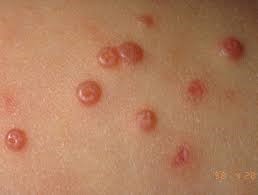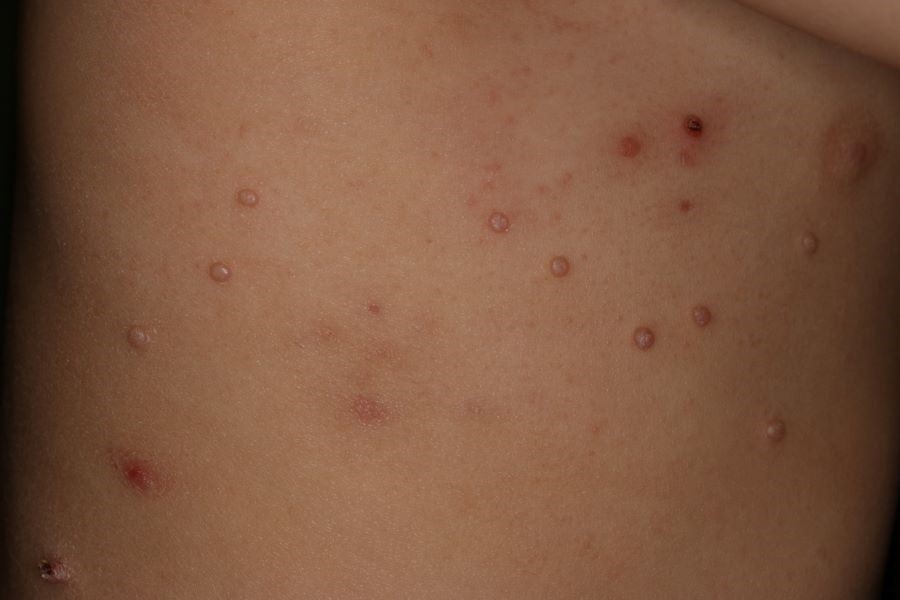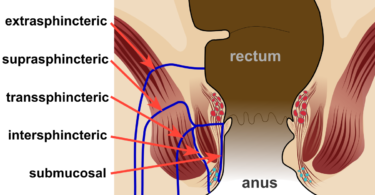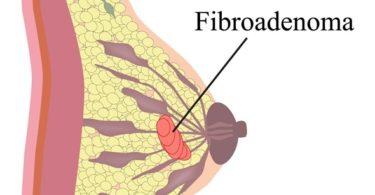Authors:
Dr Pramod Kumar Singh1 Dr Ashok bhinda 2 Dr Abhishek3
Dr Poonam Sharma4Dr. Dushyant kumar5
ABSTRACT
Molluscum contagiosum is a skin disease and mucous membrane caused by DNA Virus from the poxvirus family and Molluscum contagiosum virus[MCV] which causes one or more small lesions .This affect mostly the children. The virus spread through fomites or sexual contact with affected partner. The typical lesion appears dome-shaped, round and pinkish purple in colour 1
KEYWORDS Molluscum contagiosum, Molluscum contagiosum virus[MCV], homoeopathic management
INTRODUCTION Molluscum contagiosum is a viral infection of the skin caused by Molluscum contagiosum virus[MCV] a DNA virus belonging to the Pox viridae family and may be transmitted by skin-to- skin contact .Transmission through both sexual contact , produces flesh-coloured umblilicated hemispherical papules usually upto 5mm in diameter after an incubation period period of 3-12 weeks. large lesions may be seen in HIV infection .They are found on the genitalia,lower abdomen and upper thighs when sexually acquired.Facial lesions are highly suggestive of underlying HIV infection.1,2


EPIDEMIOLOGY3
Molluscum contagiosum is a common medical concern .It occurs world wide but seems to be more frequent in warm and humid regions. Atopic dermatitis alters the skin barrier and immunity function, so it may increase the risk for developing molluscum contagiosum. The largest incidence is in children aged between 0-14 years where the incidence rate ranged from 12-14 episodes per 1000 children per year .Swimming and eczema are associated with MC but the causal relationships are unclear. Among children boys and girls are affected equally by molluscum contagiosum . In adulthood the male to female ratio is approximately 3 to 1
PATHOGENESIS3
In molluscum contagiosum there is usually pronounced infundibular hyperplasia and papillomatosis with central umblication
Millions of virions that have proliferated in the cytoplasm of affected epithelial cells result in the characterstic intercytoplasmic bodies that compress the keratinocyte nucleus. Follicular rupture result in suppuration and inflammatory changes.
CLINICAL FEATURES3
- Incubation period 2 weeks to 6 months.
- Lesions are raised, round and flesh coloured
- Characteristically have a small indention or dot at the top near the center
- Symptoms only appear mostly on the skin. After initial infection it can take 7 days to 6 months to emerge
- Sexually transmitted Mollusca generally appear on the genitalia, groin , lower abdomen and thigh. They generally develop in small clusters and remain on top layer of skin but they can spread on other parts of body . These mollusca can also occur arms , face , hands ,chest and stomach.
- In infants and lesions are usually observed around eyes, axilla, and proximal extremities.
DIAGNOSIS
The diagnosis of molluscum contagiosum is based on clinical examination. If the lesions are firm , white to flesh coloured , dome shaped ,pearly papules having a central umblication from which one can express a cheesy material
Dermoscopy , reflectance confocal microscopy and histopathology are the useful process in the diagnosis of molluscum contagiosum
DIFFERENTIAL DIAGNOSIS
Differential Diagnosis of Molluscum contagiosum are
- Cryptococcosis
- Basal cell carcinoma
- Keratocanthoma
- Histoplasmosis
- Coccidiodomycosis
- Verruca vulgaris
- Lichen planus
- Varicella zoster
Complication
- Hypopigmentation
- Eczema
- Scarring
- Eye infection
HOMOEOPATHIC MANAGEMENT
Mollucsum contagiosum can also be cured effectively with homoeopathic medicines and it also prevents the recurrence. In Homoeopathic view it is a manifestation of sycotic miasm. Remedies selected on a constitutional basis are generally found to be effective, There are a few commonly indicated anti – viral medicines which are suitable for the condition
Homoeopathic Treatment 4,5
1. Calcarea ars – Eczema of face and scalp. Coldness of head .Pale sickly bloated face .
2.Calcarea Carb- Unhealthy : readily ulcerating , flaccid small wounds do not heal rapidly. Nettle Rash : Better in cold air.Warts on face and hands.Petechial eruptions. Chilblains Boils.
3 Dulcamara- Red spots, urticaria brought on by exposure , or sour stomach .Humid eruptions on face , genitals , hands .Vesicular eruptions. Sensitive bleeding ulcers. Itching Burns after scratching aggravated by in warmth.Aggravated from cold in general , damp rainy weather and ameliorated from external warmth
4.KALI- IOD- Worse any covering, heat of body intense.Purple spots worse on legs Tendancy to oedematous swellings of eyelids, mouth, uvula etc. acnea rosacae
5.MERCURIUS SOLUBILIS-Almost moist.Drynerss of the skin.Itching worse warmth of bed , evening.
6.Natrum Mur. Greasy oily specially on hairy parts .Dry eruptions especially on the margin of haiory scalp and bends of joints . Itching and burn.
7.Silicea – Umblicated eruptions with offensive pus . Itching only in day time and evening . Scrofulous rachitic children with large head and open fontanelles and sutures, distended abdomen .Patient chilly wants plenty warm clothing
8 Sulphur – The great characterstic of this remedy is the aggravation from washing with scratching makes the parts burn intensely . The skin is rough , coarse and measly and there is much soreness in the folds of the skin and a tendency to pustular eruptions.Itching . voluptuous; scratching aggravated ‘feel good to scratch’, scratching causes burning ,from heat of bed.
9.Thuja Occidentalis- Eruptions only on the covered parts ; worse after scratching .Very sensitive to touch. Ill effects of vaccination ; Vaccinosis ,ineviterable skin troubles
10. Tuberculinum – also has a good role in establishing cure if given as intercurrent
References:
- Thomas P Habif.Clinical dermatology,a color guide to diagnosis and therapy.fifth edition.elsevier Ltd.2009
- Davidson S. Principles & Practice of Medicine. 22nd ed. Philadelphia: Elsevier; 2014.
- Harper’s textbook of pediatric dermatology,Volume 1,third edition;blackwell publishing Ltd.2011
- William Boericke .Pocket manual of homoeopathic material medica and repertory;B.jain publishers.New Delhi,India;2011
- Allen HC. Allen’s Keynotes Rearranged & Classifed. Reprint. New Delhi: B. Jain Publishers (Pvt.) Ltd, 2006.
Dr Pramod kumar Singh1 Dr Ashok Bhinda2 Dr Abhishek3 Dr Poonam Sharma4 Dr.Dushyant Kumar5
1. Professor and HOD of Homoeopathic pharmacy , Dr.M.P.K Homoeopathic Medical college Hospital and research centre Saipura ,Jaipur
2.Professor , Department of Homoeopathic pharmacy , Dr.M.P.K Homoeopathic Medical college Hospital and research centre Saipura ,Jaipur
3.MD scholar , Department of Homoeopathic pharmacy , Dr.M.P.K Homoeopathic Medical college Hospital and research centre Saipura ,Jaipur
4.MD scholar , Department of Homoeopathic pharmacy , Dr.M.P.K Homoeopathic Medical college Hospital and research centre Saipura ,Jaipur
5.MD scholar , Department of Homoeopathic pharmacy , Dr.M.P.K Homoeopathic Medical college Hospital and research centre Saipura ,Jaipur





